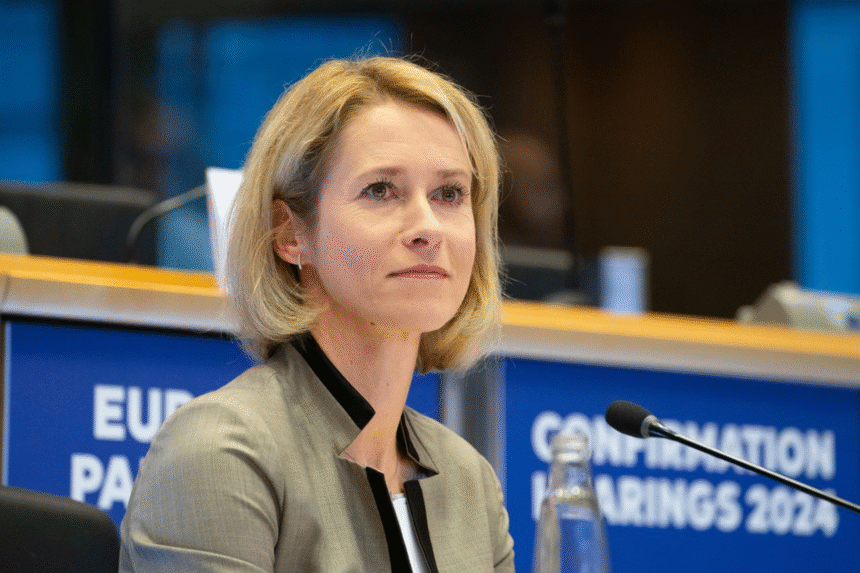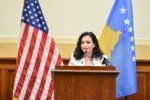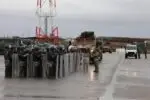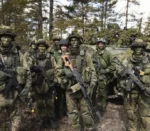From the evening of May 21 through yesterday, the EU High Representative, Kaja Kallas, visited three Western Balkan countries. She began her trip in Belgrade, continued to Prishtina, and concluded in Skopje. Her message was clear to all six countries in the region aspiring to join the European Union: “Seize the current momentum for enlargement.”
“Yes, this process has taken a long time, but there is always a political momentum and that momentum is now. A united Europe is a vision we all must work toward,” Kallas said during her press conference in Belgrade on May 22.
Her visit to Belgrade followed Serbian President Aleksandar Vučić’s recent trip to Moscow. For this reason, Kallas didn’t hesitate to highlight the differences between Serbia and the EU.
“As expected, our views are quite divergent, but we had a good exchange on issues including Serbia’s EU accession, domestic reforms, and the ongoing dialogue with Prishtina,” she said while also commenting on Vučić’s visit to Moscow:
“I truly do not understand why it is necessary to stand side by side with the person waging this horrific war in Ukraine.”
Kallas reminded Serbia of the obligations it must meet if it wants to join the EU:
“Reforms are the path forward for Serbia’s EU journey. There are no shortcuts to membership. Real progress must happen here in Belgrade, and the next steps are very clear: media freedom, fighting corruption, and electoral reforms.”
She confirmed that she had also discussed Serbia’s relationship with its “closest neighbor” and announced potential movement in the stalled Kosovo-Serbia dialogue:
“Normalizing relations with Kosovo isn’t just about improving bilateral ties. It’s essential for Serbia’s European future. It’s time to move past the past and focus on a shared future. I plan to invite representatives from Belgrade and Pristina to Brussels as soon as possible to discuss concrete next steps.”
Kallas also stressed to President Vučić the importance of stability in Bosnia and Herzegovina:
“I also addressed the situation in Bosnia and Herzegovina. I emphasized to President Vučić and other leaders the importance of Serbia’s leadership and constructive role in supporting the country’s stability.”
“The region’s future depends on it,” she concluded in Belgrade.
Later that day in Prishtina, Kallas reiterated the strategic importance of the Western Balkans for the EU:
“EU enlargement in this region is our most important geopolitical project—and also a personal priority for me.”
She delivered a message in Prishtina that she could not in Belgrade:
“It’s good to see that EU membership is supported by the majority of people in Kosovo and across the political spectrum,” she said, adding that Kosovo belongs to the European family—but there are no shortcuts to membership.
“Progress can only be achieved through sustainable reforms.”
Before addressing Kosovo’s relationship with Serbia, Kallas highlighted the importance of functional institutions in Kosovo to benefit from the EU Growth Plan, a financial package designed for the six Western Balkan countries.
“The EU’s Growth Plan for the Western Balkans is a major opportunity for gradual integration into the EU’s single market, which brings prosperity to people. Kosovo was the first to present a reform agenda and is well-positioned to benefit from the Growth Plan. But to make this happen, Kosovo needs functioning institutions capable of implementing reforms effectively. That’s why I encourage all parties to break the political deadlock and form a government swiftly, so Kosovo can benefit from our support.”
Kallas said she also came to Prishtina to listen and better understand the security situation in Kosovo and the region:
“A key priority remains the normalization of relations between Kosovo and Serbia. You are equal partners at the table. As the EU and as the High Representative, I will continue to support this process. And for those who still doubt it, let me be clear: normalizing your relations is the only path to a safer and more prosperous future for the people of this region. Stability depends on dialogue—not confrontation.”
She also brought an update on EU sanctions:
“As a sign of our commitment, I can announce that the EU has begun gradually lifting the measures introduced in June 2023. This decision opens the door to greater development opportunities for Kosovo and closer ties with Europe. But this is conditional on continued de-escalation in the north.”
Kallas warned that the closure of Serbia-backed structures in northern Kosovo undermines de-escalation efforts:
“Kosovo has made significant progress in strengthening democratic institutions in recent years, and our mission EULEX continues to support the rule of law in Kosovo. But again, the current political gridlock is holding Kosovo back.”
She emphasized once more that forming a new parliament and government is key for Kosovo’s stability, growth, and European future:
“I urge all political actors across the political spectrum to work genuinely with one another and with Kosovo’s represented communities. The European Union is ready to support you, but political leaders must set aside divisions and prioritize Kosovo’s future,” she said in her closing remarks in Pristina.
In Skopje, Kallas held her press conference alongside North Macedonia’s Prime Minister, Hristijan Mickoski. Unlike in Belgrade and Prishtina, in Skopje—where she was visiting for the first time—Kallas had more praise for the country’s progress toward EU membership:
“The European Union strongly supports North Macedonia on your path toward the European Union. You are the first beneficiary in the region of the EU Growth Plan for the Western Balkans. You just mentioned how well your economy is doing—I think we all benefit from that. And you are the first country in the region to sign a Security and Defense Partnership with the EU.”
She said this partnership encourages joint work on Ukraine, hybrid threats, and counter-terrorism, and demonstrates that gradual integration works in practice—“but both sides want more, and that’s clear.”
“North Macedonia belongs in the EU. You have a strong history of alignment with the EU’s Common Security and Foreign Policy. That’s very important to us, especially in these turbulent times of major geopolitical shifts in the world.”
She also highlighted North Macedonia’s role in regional stability:
“Your contribution to EUFOR Althea in Bosnia and Herzegovina is a clear example that you are a reliable partner for regional security. I commend the strong efforts made by your government in your reform agenda.”
Kallas mentioned the examples of Albania and Montenegro as well:
“We know from experience that progress can be swift when there is political will. Albania and Montenegro are good examples of this.”
“We believe the integration of the Western Balkans into the European Union is the best recipe for peace and security across the region.”
She concluded in Skopje:
“So let’s move forward together—and I assure you, the European Union stands firmly by your side.”







